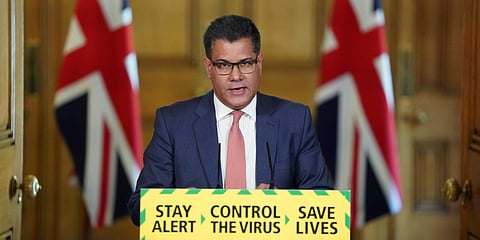

LONDON: Britain's Indian-origin business minister Alok Sharma on Sunday announced a new 93-million pounds investment to accelerate construction of a new vaccine manufacturing facility as part of wider plans to combat the coronavirus pandemic.
The UK Secretary of State for Business, Energy and Industrial Strategy (BEIS) said that the new Vaccines Manufacturing and Innovation Centre (VMIC), when completed, will have capacity to produce enough vaccine doses to serve the entire UK population in as little as six months.
The funding will ensure the centre opens in the first half of the next year, 12 months ahead of schedule. A further 38 million pounds government investment will go towards establishing a rapid deployment facility, to be ready in the coming months.
"As the biggest contributor to the international coalition to find a vaccine, the UK is leading the global response. Once a breakthrough is made, we need to be ready to manufacture a vaccine by the millions. The new Vaccine Manufacturing and Innovation Centre and temporary facility will build 'fill and finish' capacity, bringing the UK vaccine programme together from discovery to distribution," said Sharma.
The new centre, already under construction, is said to be a key component of the government's coronavirus programme in boosting the UK's capacity to develop and mass produce vaccines.
To be located on the Harwell Science and Innovation Campus in Oxfordshire, the new centre will be the UK's first not-for-profit organisation established to develop and advance the mass production of vaccines.
BEIS said that this will boost the UK's long-term capacity against future viruses and will also accelerate the production of vaccines for existing illnesses, such as the flu virus. "Today's announcement by the Business Secretary is an important endorsement for the work the Vaccine Manufacturing and Innovation Centre will deliver in shoring up future domestic supply of vaccines in response to a pandemic," said Dr Matthew Duchars, the Vaccines Manufacturing and Innovation Centre's Chief Executive.
"This investment will rapidly accelerate the construction of the facility, enabling us to bring it online a year sooner. In addition, the capacity will be significantly increased, so that enough vaccines could be made for everyone in the UK within a matter of months of opening," he said.
While the new centre is being built, the government will establish the rapid deployment facility to begin manufacturing at scale from this year itself to support efforts to ensure any COVID-19 vaccine is widely available to the public as soon as possible.
UK Research and Innovation (UKRI) Chef Executive Sir Mark Walport, said: "The Vaccines Manufacturing and Innovation Centre is an essential new weapon in the UK's arsenal against diseases and other biological threats, ensuring sufficient vaccines get to the public in the fastest possible time."
"The UKRI-funded teams at the University of Oxford and Imperial College London have developed potential coronavirus vaccines at unprecedented speed. By working with partners including government, VMIC and the Vaccines Taskforce to fast-track the manufacturing capability, we are ensuring that momentum will continue all the way from lab to patient," he added.
The UK government highlighted that it has pledged 250 million pounds to the Coalition for Epidemic Preparedness Innovations (CEPI), the highest contribution of any country, and is also hosting the upcoming global pledging conference for Gavi, the Vaccine Alliance, on June 4.
This forms part of the UK's COVID-19 strategy committing 388 million pounds to the international drive to develop vaccines, tests and treatments. The novel coronavirus, which emerged in Wuhan in December last year, has killed more than 312,000 people worldwide and infected over 4.6 million others.